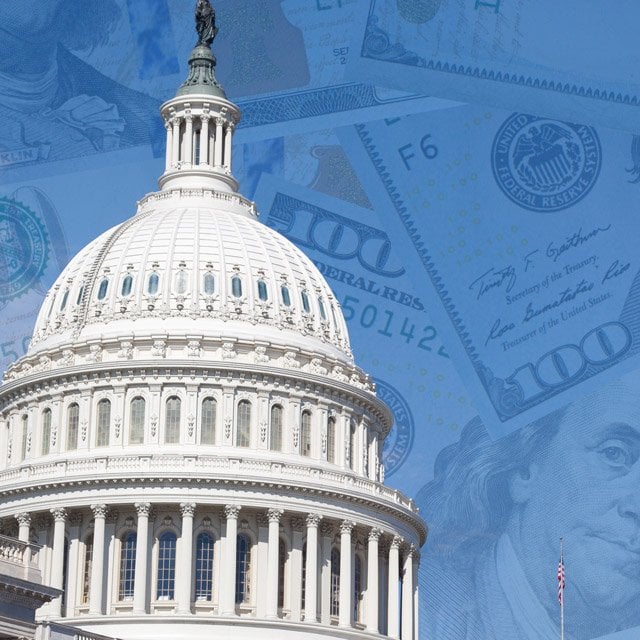 Money and the U.S. Capitol
Money and the U.S. Capitol
The credit union tax exemption appeared to dodge a bullet Monday afternoon as text of the Republican tax bill lacked any reference to the issue.
The House Ways and Means Committee will meet at 2 p.m. Tuesday to consider the tax bill. An updated 389-page draft of the bill was released about 3 p.m. ET.
Recommended For You
Bankers have wanted the bill to include a provision to end the exemption, but representatives of America’s Credit Unions (AmCU) and the Defense Credit Union Council (DCUC) told reporters Monday morning that they thought their strategy to ensure the exemption stays out of the bill would succeed.
After the draft was released, Jim Nussle, America’s Credit Unions' president/CEO, thanked the House Ways and Means Committee “for recognizing the value of protecting the credit union tax status in their proposed reconciliation bill.
“Together with leagues, credit unions and industry partners, we have worked hard to show the impact credit unions have on their 142 million members and communities. We remain engaged with the committee as it considers amendments through the markup process to ensure no new tax is added on credit unions. Credit unions are here to strengthen Main Street, and we will keep our momentum."
After looking through the bill, Jason Stverak, chief advocacy officer at DCUC, said he found no reference to "credit unions," "federal credit unions," or "501(c)(14) tax-exempt entities".
“There are no proposed changes to the Internal Revenue Code that would affect the credit union tax-exempt status, nor does the bill introduce Unrelated Business Income Tax (UBIT) provisions or modifications to NCUA oversight,” he said.
Nussle said credit unions and credit union groups have been able to convey to lawmakers over the past six months the meaning of "the credit union difference," the message of "don’t tax my credit union,” and the notion that credit unions have “earned the tax exemption” based on how they have carried out their mission.
Even with the tax exemption out of the mark-up, an amendment to end the exemption could emerge later. But Nussle and Stverak said they believe they have the leverage to defeat such an attempt.
“They don’t have the votes," Nussle said. “We have the votes to stop that kind of an effort because we also believe we had the votes to strip a provision if it gotten in there.”
The House plans to vote on the tax bill before the Memorial Day recess, and Nussle said AmCU is now refocusing on its next stop: The Senate.
Nussle said his real concern is that at some point in a reconciliation process two or three key congressional leaders will be in a room at 3 a.m. trying to figure out what is needed to add to the bill to sway a handful of votes needed for final passage. At that point, Nussle wants to be sure they recognize the credit union tax exemption lacks the juice to make that squeeze worthwhile.
Or, Nussle said, he hopes they at least realize: “Don’t piss off the credit unions because they have a lot of votes.”
A DCUC news release said the reconciliation process — particularly in a divided Congress — leaves the door open for amendments, including those that could be introduced with little notice.
“As we’ve seen in the past, harmful provisions can be added at the last minute, sometimes in the dead of night,” DCUC President/CEO Anthony Hernandez said. “That’s why we are staying engaged with every step of the process — from markup to floor debate — and working in lockstep with leagues, member credit unions and the broader ‘Don’t Tax My Credit Union’ coalition to ensure policymakers fully understand the critical value our institutions bring to the communities we serve.”
Contact Jim DuPlessis at [email protected].
© Touchpoint Markets, All Rights Reserved. Request academic re-use from www.copyright.com. All other uses, submit a request to [email protected]. For more inforrmation visit Asset & Logo Licensing.







